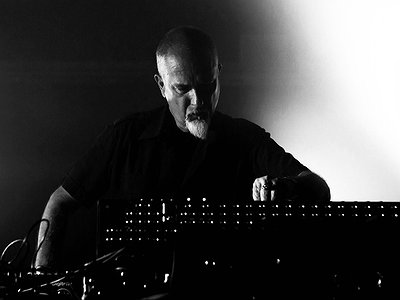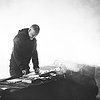Name: Eraldo Bernocchi
Occupation: Composer, producer, sound artist, label founder at Rare Noise
Nationality: Italian
Current Release: Eraldo Bernocchi's new release under his Simm moniker, Too Late to Dream, is out via Ohm Resistance.
Recommendations: Today’s suggestions, tomorrow they’ll be different for sure
Read: “The songs of Maldoror” – Lautreamont
Listen: “The White Arcades” – Harold Budd
See: “Isle of the dead” – Arnold Böklin
If you enjoyed this interview with Eraldo Bernocchi and would like to stay up to date on his music and creative activities, visit his official website. Or drop by his profiles on Instagram, Facebook, and Soundcloud.
Over the years, Eraldo has worked with a wide range of artist. Here is a selection of features with past collaborators:
[Read our Colin Edwin interview]
[Read our Gaudi interview]
[Read our Markus Stockhausen interview]
[Read our Nils Petter Molvaer interview]
When did you start writing/producing music - and what or who were your early passions and influences? What was it about music and/or sound that drew you to it?
I was 14 years old, I started to listen to any kind of music, except Italian songs, I never could stand them.
My favourite bands were Pink Floyd, Black Sabbath, Led Zeppelin, Sex Pistols, The Damned, Motörhead and so on. I then discovered Throbbing Gristle, Discharge, Brian Eno, Tangerine Dream, Slayer.
I’m a mixture of all the above. I was drew by energy and emotions. And also today I need power in sound, energy and emotions. You can play me the best recording of piano solo on earth but if I don’t find anything emotional or rich of feeling it'll bore me to death.
[Read our interview with Cosey Fanni Tutti of Throbbing Gristle]
[Read our Tangerine Dream interview]
For most artists, originality is preceded by a phase of learning and, often, emulating others. What was this like for you: How would you describe your own development as an artist and the transition towards your own voice?
I was obviously also emulating others, like all teenagers I guess. I’m a guitar player so I was naturally inclined to listen to and emulate my idols. Jimmy Page, Tony Iommi, Ace Frehley, David Gilmour, those were my references at the time. Then punk came and everything changed. Suddenly all was easier to learn, anybody could do music.
It was pure energy. I was playing in a couple of bands, mostly metal and punk covers. After a while I started to get bored as I always wanted to change the structure of the songs, I liked to improvise, but there was no interest in that as the other members were into keeping things as they were. I started to experiment with tapes and machines, mostly tearing them apart and hacking the deck motors to change speed and sound quality. I loved to process sounds in guitar pedals ad I looked for broken spring reverbs to build sound tools. Sometimes it was working, others it was a failure.
I also started to approach the guitar as a sound tool more than an instrument, an oscillator. I still like to play metal/doom in some projects, but I see guitars more as sound generators.
I fell in love with electronics, and I never stopped researching with them.
How do you feel your sense of identity influences your creativity?
I really don’t know …
I have ideas, values. Like anyone. I know what I don’t want. Maybe my identity is the result of the latter and I’m creatively always stimulated to research and go on building new projects and ideas. At the very same time what I do not want shapes my sound world, as well as my life.
Under this light my identity and the relationship with the outside world dictates my creativity, but I do not identify with anything in particular.
What were your main creative challenges in the beginning and how have they changed over time?
Nobody was interested in listening to noise music or electronics. Very few people were open enough to approach music from a sound perspective, sound as a tool, as a way to create and destroy.
When I created Sigillum S, together with Paolo Bandera and Luca Di Giorgio, we were finally finding “brothers” in frequencies and finally express ourselves. Those were the DIY times, we were duplicating tapes at home and selling them via mail order. We found two labels that were interested in what we were doing and since that moment we never stopped.
Quite obviously , except for some journalist who supported our research, we weren’t really recognized in Italy, the interest mostly came from abroad as well as for what concerns myself and my projects it took even longer. It happened when I started to collaborate on an international level. The classic narrow minded approach, but I guess it’s like this pretty much everywhere.
As creative goals and technical abilities change, so does the need for different tools of expression, be it instruments, software tools or recording equipment. Can you describe this path for you, starting from your first studio/first instrument? What motivated some of the choices you made in terms of instruments/tools/equipment over the years?
In order of time:
Electric guitar, pedals, cheap amp, tape machine: this is all I had.
4 track cassette tape recorder, analogue delay, reverb, metal pieces, springs, a mic; the recorder has been a revolution, I started using effects and understand what mixing and producing mean.
Sampler, sequencer: Casio FZ1 was my first sampler and an Alesis sequencer. An incredible combo for those times. The possibility to sample from various sources opened up an universe of options. Deciding to create a pad using a car crash wave form, for example, is something that will always amaze me. I use samplers on a daily basis sampling everything inspires me.
Analog synths: working on frequencies, sweeping through them is still one of my favorite things. The analogue bass. That’s a life a changer for me.
Digital Synths: when they appeared I started to experiment more and more with numbers. Magickal numbers applied to frequencies and harmonics. I was programming sounds mainly based on those concepts. In the end I got bored of digital synths and their sound but they’ve been really interesting as mind opener to new territories and the multi timbral world.
Computer recording system: super exciting but also super confusing. It’s a necessary evil, we are all bounded to it but a few years ago I went back to use it as an endless tape recorder. Too many possibilities, too many sounds. I like limits. They are stimulating, boundaries are giving way to new ideas and workarounds.
Baritone Guitars: I'm using 90% of my time only these guitars. I love the deepnes they have. They completely changed my view of the instrument.
Cubase, Ableton Live, Pro Tools: Cubase has been the start of my relationship with a computer. Ableton live is still really useful when I score adverts, it's quick.
Pro Tools is my favourite. It's a giant tape recorder and mixing board with an intuitive sound editing.
Tons of pedals, load of synths and noise boxes: I love small boxes, noisy stuff. As well as drum machines and synths. It's an endless exploration and very likely an addiction.
Have there been technologies or instruments which have profoundly changed or even questioned the way you make music?
As I said above the first multitrack cassette recorder, Fostex X-15 and the casio FZ1 sampler. These two machines realy changed my approach to music and, especially the tape recorder, opened the doors of studio recording. I started to think in terms of “arranging” tracks, overdubs, mixing them, mastering them.
You need to approach the above terms with a pinch of salt as all I had was a 4 tracks cassette recorder and a 2 track one for masters. Still today there are some pieces from that time that sound quite good. Amazing.
Collaborations can take on many forms. What role do they play in your approach and what are your preferred ways of engaging with other creatives through, for example, file sharing, jamming or just talking about ideas?
I like to collaborate with artists, most of my album are collaborative. I easily bore myself when I work alone, and I find it very often an exercise of mental onanism as you don’t relate to anything external, you live on your creative planet and reassure yourself that what you’re doing is good and has a value. On the other side collaborating is a mutual learning process, there’s a constant exchange, new ideas bloom and the horizon widens.
I use all three methods you mentioned. It depends where I am and where is / are the artists I’m working with. If I have to choose I prefer being together in the same studio at the same time but sometime it isn't possible so exchanging files works just well.
Take us through a day in your life, from a possible morning routine through to your work, please. Do you have a fixed schedule? How do music and other aspects of your life feed back into each other - do you separate them or instead try to make them blend seamlessly?
I have a pretty fixed schedule as I'm father of an 8 years old girl so there’re certain task in the morning I can’t avoid.
I wake up quite early around 6:30/7:00, usually earlier than the rest of the family, I read the news in bed with the ipad, do emails or study manuals. After my daughter is dropped off at school, either by me or my wife, there’s the business part like invoices, follow ups, phone calls etc etc. Then studio time.
Depending on what I’m working on, and its deadline, my personal projects can happen in the morning or in the evening. If I’m working on an advert and I must quickly deliver that is my priority and I’ll work on my stuff later in the day or even after dinner. Otherwise I work since morning to the moment my daughter will be back home. Then it’s father time, cooking and relax.
I’m kind of forced to separate music from daily life even if in the end they melt in some way.
Interviews / About
Fifteen Questions Interview with Eraldo Bernocchi
Unrequested Magic
Part 1

"I easily bore myself when I work alone. I find it very often an exercise of mental onanism as you don’t relate to anything external. Collaborating, on the other hand, is a mutual learning process. There’s a constant exchange, new ideas bloom and the horizon widens."


